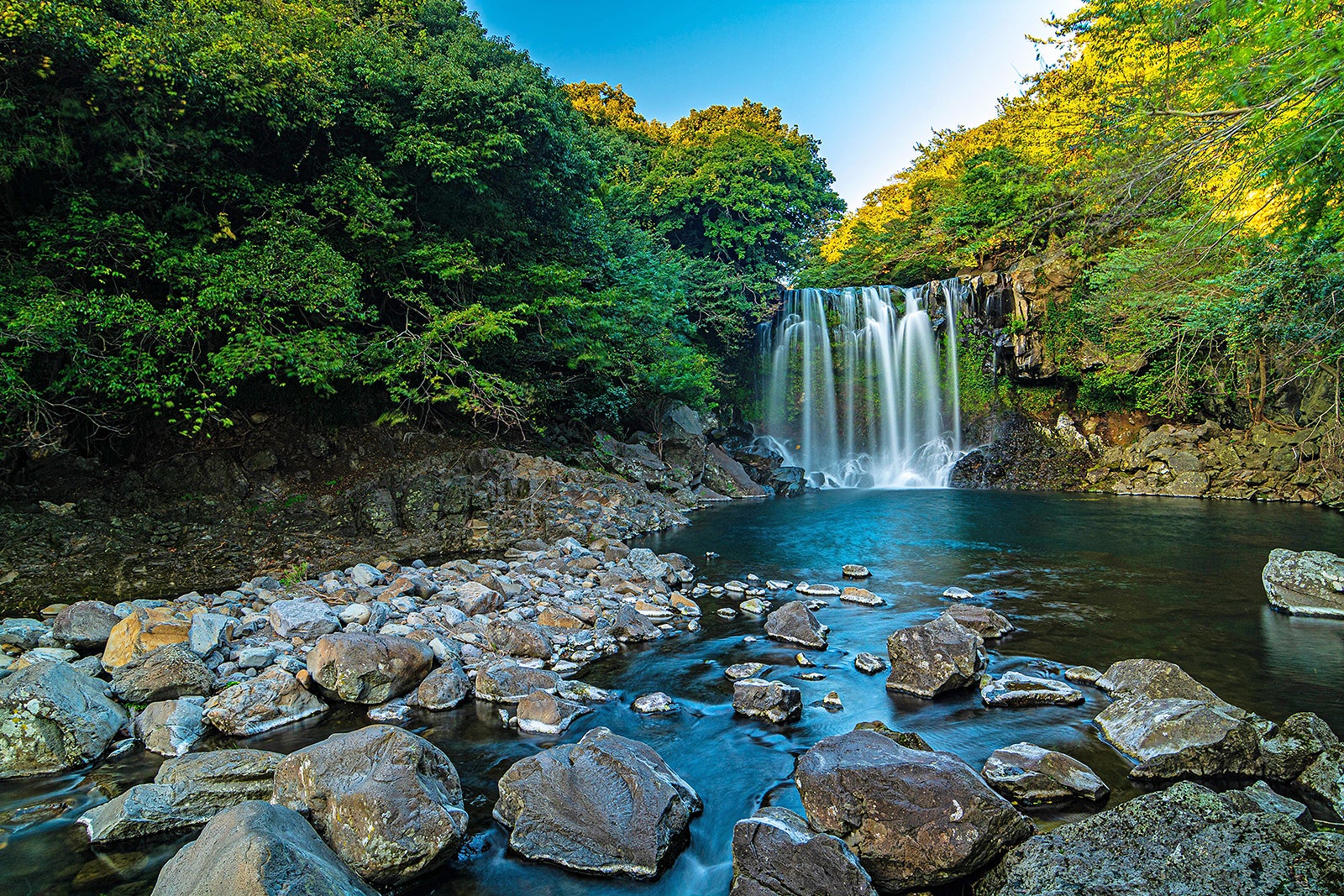Are you ready to embark on a journey to the stunning island of Jeju? Known for its awe-inspiring natural wonders, this enchanted island offers breathtaking landscapes that will leave you in awe. From majestic waterfalls cascading down lush cliffs to stunning volcanic formations, Jeju Island is a paradise waiting to be discovered. Immerse yourself in the vibrant colors of the blossoming flowers in Hallasan National Park or marvel at the beauty of the majestic Seongsan Ilchulbong crater. Whether you’re a nature enthusiast or simply seeking serenity, Jeju Island is the perfect destination to escape into the wonders of the natural world.
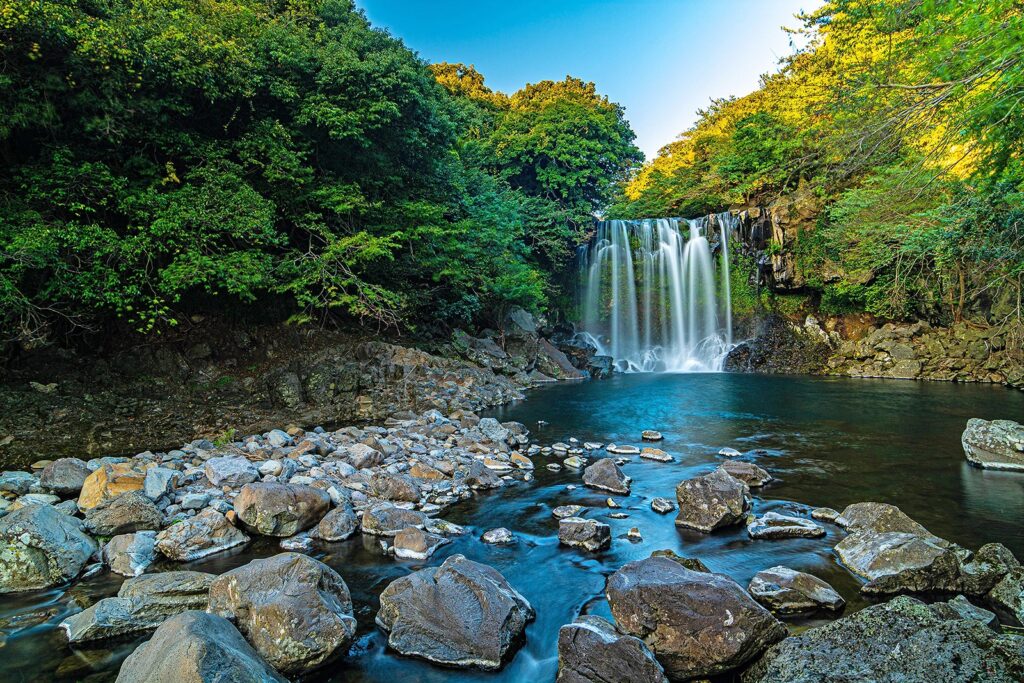
Geography and Location
Location of Jeju Island
Jeju Island, also known as Jeju-do, is a stunning volcanic island located in the southern part of South Korea. Situated in the Korea Strait, between the country’s mainland and Japan, Jeju Island is the largest island in South Korea. It is approximately 73 kilometers (45 miles) south of the Korean Peninsula. Its geographical location has made it a popular tourist destination, attracting visitors from all over the world.
Formation of Jeju Island
Jeju Island is a volcanic island formed approximately 1.2 million years ago due to volcanic activity. It is believed that volcanic eruptions and lava flows over hundreds of thousands of years contributed to the creation of this beautiful island. The volcanic landscape has left a remarkable imprint on Jeju Island’s topography, making it a unique and picturesque destination for nature lovers.
Mountains and Volcanic Craters
Hallasan
One of the highlights of Jeju Island is Hallasan, a majestic shield volcano and the highest mountain in South Korea. Standing at an impressive height of 1,950 meters (6,398 feet), Hallasan offers breathtaking views and a variety of hiking trails for outdoor enthusiasts. The journey to the summit is a challenging but rewarding experience, providing hikers with a chance to admire the island’s lush forests, vibrant flora, and panoramic vistas.
Seongsan Ilchulbong
Seongsan Ilchulbong, also known as Sunrise Peak, is a volcanic crater located on the eastern coast of Jeju Island. This UNESCO World Natural Heritage site is famous for its unique horseshoe-shaped structure and stunning sunrise views. Visitors can climb to the peak of the crater and witness the first rays of sunlight illuminating the vast expanse of the East China Sea, creating a truly mesmerizing spectacle.
Sunrise Peak
Located in Seogwipo, Sunrise Peak is another iconic volcanic crater on Jeju Island. It is renowned for its picturesque landscapes and surreal views of the surrounding coastline. As the name suggests, the best time to visit this scenic spot is during sunrise, when the sky is painted with vibrant hues and the sun emerges from the horizon, casting a golden glow over the land and sea.
Daepo Jusangjeolli Cliff
Daepo Jusangjeolli Cliff is a natural wonder located along the southern coast of Jeju Island. This mesmerizing cliff formation was created by the cooling and cracking of lava flow from the volcanic eruption. The unique hexagonal basalt columns create a stunning spectacle, especially during high tide when the waves crash against the cliffs, creating a symphony of natural sounds.
Cheonjiyeon Waterfall
Nestled in a lush forest in Seogwipo, Cheonjiyeon Waterfall is a majestic cascade that offers a peaceful and serene atmosphere. Its name, which means “Pond of the Emperor of Heaven,” reflects the ethereal beauty and tranquility of this natural wonder. Surrounded by dense vegetation and vibrant flora, the waterfall is a popular spot for nature lovers, who can enjoy the rejuvenating energy and pristine beauty of this enchanting place.
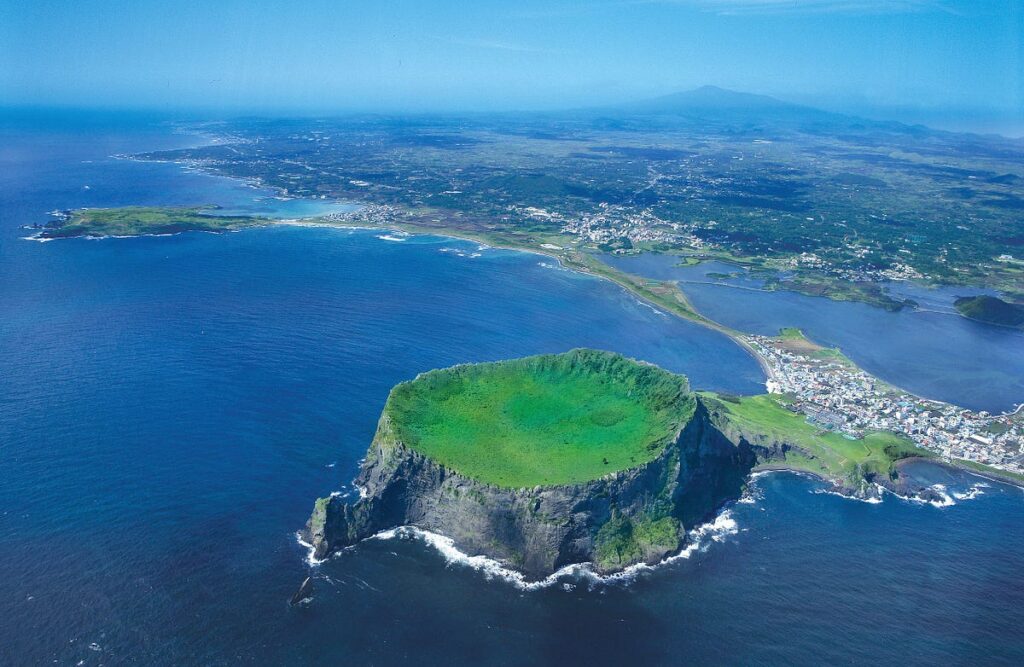
Beaches and Coastline
Hyeopjae Beach
Hyeopjae Beach is one of the most popular beaches on Jeju Island, known for its crystal-clear waters and pristine white sand. Located on the western coast of the island, this beach offers breathtaking views of nearby islands and is an ideal spot for swimming, sunbathing, and water sports. The beach is also surrounded by lush pine forests, adding to its natural beauty and providing shade for visitors on hot summer days.
Hamdeok Beach
Hamdeok Beach is another picturesque coastal gem on Jeju Island. With its turquoise waters, golden sand, and dramatic rock formations, this beach offers a truly idyllic setting for relaxation and recreation. The calm and shallow waters make it perfect for families with children, while the nearby cafes and restaurants provide a range of delicious local delicacies to satisfy your taste buds.
Jungmun Saekdal Beach
Jungmun Saekdal Beach is a hidden gem nestled in the Jungmun Tourist Complex, surrounded by cliffs and lush forests. The unique feature of this beach is its multi-colored pebbles, which create a stunning mosaic of vibrant hues along the shoreline. This beach is less crowded than some of the other tourist spots on the island, offering visitors a peaceful and secluded escape to enjoy the beauty of nature.
Manjanggul Cave
Manjanggul Cave is not only a natural wonder but also a UNESCO World Heritage site. It is one of the longest lava tube caves in the world, stretching over 13 kilometers (8 miles). The cool and dark interior of the cave creates a fascinating underground world, adorned with impressive lava formations and unique geological features. Exploring this natural phenomenon is a must for anyone visiting Jeju Island.
Botanical Gardens and Parks
Jeju Stone Park
Jeju Stone Park is a unique attraction that showcases the geological wonders of Jeju Island. This park displays a vast collection of towering stone sculptures, known as dol hareubangs, which are considered to be protectors of the island. Visitors can also explore various walking trails that wind through lush gardens, offering an opportunity to immerse themselves in the island’s rich cultural and natural heritage.
Eco Land Theme Park
Eco Land Theme Park is a delightful destination for nature lovers and families to enjoy a fun-filled day surrounded by Jeju Island’s natural beauty. This ecological park features a picturesque train ride that takes visitors through diverse landscapes, including forests, lakes, and lush greenery. The park also offers a variety of activities, such as pony rides, pedal boats, and ecological exhibits, providing an educational and entertaining experience for all ages.
Jeju Kimnyoung Maze Park
Jeju Kimnyoung Maze Park is a fascinating attraction that offers a unique and challenging adventure. This maze, made up of carefully trimmed hedges, covers an area of over 3,000 square meters (32,300 square feet) and consists of various routes and dead ends. Navigating through the maze is an exciting and enjoyable activity for both children and adults, providing a sense of adventure and fun.
Yeomiji Botanical Garden
Yeomiji Botanical Garden is a paradise for plant enthusiasts, showcasing a diverse collection of flora from Jeju Island and around the world. Spanning over 30,000 square meters (322,900 square feet), this botanical garden is home to thousands of plant species, including exotic orchids, tropical palms, and vibrant flowering plants. Visitors can explore the various themed gardens, relax in serene surroundings, and appreciate the intricate beauty of nature.
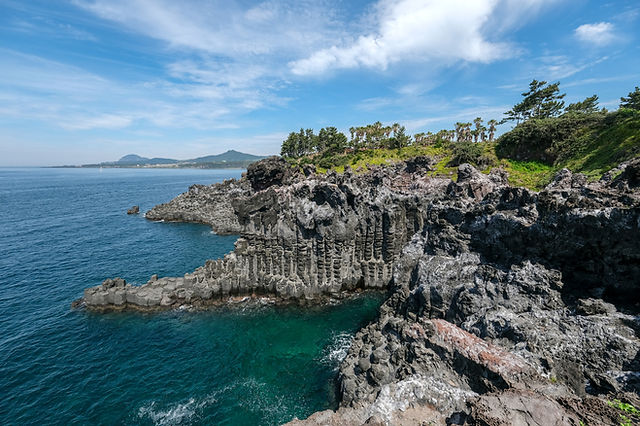
Cultural and Historical Sites
Jeju Folk Village Museum
The Jeju Folk Village Museum offers a glimpse into the traditional way of life on Jeju Island. This living museum features a collection of traditional houses, known as hanok, which showcase the architecture and lifestyle of the island’s past. Visitors can explore the village, interact with local artisans, and learn about the customs, traditions, and folklore of the Jeju people.
Seongeup Folk Village
Seongeup Folk Village is a well-preserved traditional village that provides a fascinating insight into Jeju Island’s rural life. This village is home to historic thatched-roof houses, stone-walled alleys, and ancient shrines, all of which have been carefully preserved to maintain the island’s cultural heritage. Visitors can wander through the village, visit traditional workshops, and experience the warmth and simplicity of Jeju’s traditional way of life.
Teddy Bear Museum
If you’re looking for a unique and whimsical experience on Jeju Island, the Teddy Bear Museum is a must-visit. This charming museum showcases a vast collection of teddy bears from around the world, displaying them in creative and imaginative settings. From historical figures to famous works of art, the teddy bears come to life in various scenes, offering a delightful and nostalgic journey through time.
Jeju Haenyeo Museum
The Jeju Haenyeo Museum pays tribute to the strong and resilient women divers, known as haenyeo, who have been the backbone of Jeju Island’s fishing industry for generations. This museum provides an in-depth look into the haenyeo culture, showcasing their tools, traditions, and the challenges they face while diving deep into the ocean to harvest seafood. Visitors can learn about the history and traditions of these remarkable women and gain a deep appreciation for their vital role in Jeju Island’s heritage.
Jeju Dinosaur Land
For those with a fascination for ancient creatures, Jeju Dinosaur Land offers a thrilling adventure into the prehistoric world. This theme park features life-size replicas of various dinosaur species, including the fearsome Tyrannosaurus rex and the towering Brachiosaurus. Visitors can explore interactive exhibits, participate in educational programs, and experience the excitement of discovering fossils firsthand. Jeju Dinosaur Land is both educational and entertaining, making it a perfect destination for families and dinosaur enthusiasts alike.
Waterfalls and Underground Tunnels
Cheonjiyeon Waterfall
Cheonjiyeon Waterfall, meaning “Pond of the Emperor of Heaven,” is a breathtaking waterfall located in a serene forest in Seogwipo. Surrounded by lush vegetation, this cascade plunges down from a height of 22 meters (72 feet), creating a mesmerizing spectacle of mist, sound, and natural beauty. The sound of the waterfall, coupled with the tranquil atmosphere, provides a calming and peaceful ambiance that is truly refreshing.
Jeongbang Waterfall
Jeongbang Waterfall is one of the few waterfalls in the world that falls directly into the ocean. Located on the southern coast of Jeju Island, this waterfall offers a magnificent sight as the cascading waters merge with the turquoise sea. Visitors can witness the power and beauty of nature up close, as they stand on the rocky shore, feeling the cool mist from the waterfall and listening to the rhythmic sound of the crashing waves.
Manjanggul Cave
As mentioned earlier, Manjanggul Cave is not only a lava tube cave but also a remarkable underground tunnel system. This visually stunning cave showcases intriguing lava formations, such as lava stalagmites and lava shelves, which were formed as a result of ancient volcanic activity. Visitors can explore the vastness and grandeur of the cave, immersing themselves in its eerie yet captivating beauty.
Dragon Head Rock
Dragon Head Rock, also known as Yongduam, is a natural rock formation located on the southern coast of Jeju Island. Shaped like a dragon’s head, this iconic landmark has become a symbol of the island, attracting tourists from far and wide. Visitors can marvel at the rugged cliffs, the crashing waves, and the dramatic rock formation, immersing themselves in the natural wonders that Jeju Island has to offer.
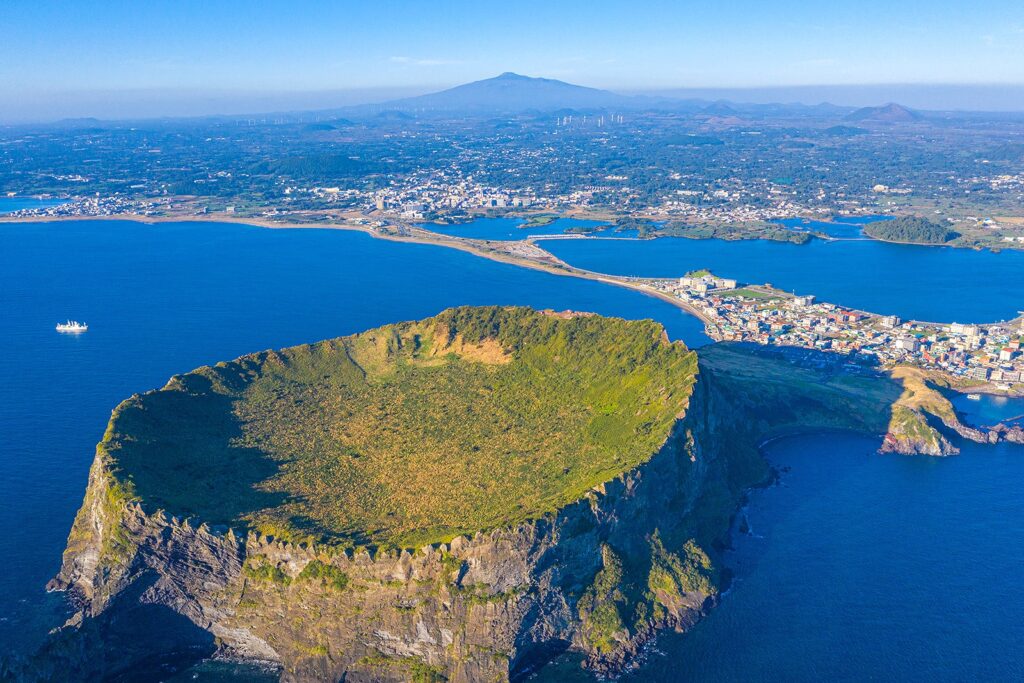
Unesco World Heritage Sites
Seongsan Ilchulbong
Seongsan Ilchulbong, or Sunrise Peak, is not only a volcanic crater but also a UNESCO World Natural Heritage site. As mentioned earlier, this unique formation offers stunning views and is particularly mesmerizing during sunrise. The combination of the horseshoe-shaped crater, the surrounding coastal cliffs, and the panoramic views of the sea make it a truly remarkable and picturesque destination.
Manjanggul Cave
Manjanggul Cave, in addition to being an underground tunnel system, is also recognized as a UNESCO World Heritage site. The cave’s geological significance, coupled with its unique lava formations, has made it an invaluable natural treasure. It provides an opportunity for visitors to witness the geological forces that shape our planet and gain a deeper understanding of Jeju Island’s volcanic past.
Hallim Park
Hallim Park is not only a botanical garden and park but also a UNESCO World Natural Heritage site. This sprawling park boasts a diverse range of plant species, as well as various attractions, including beautiful gardens, lava caves, and picturesque landscapes. Hallim Park is a haven for nature lovers, offering a serene and captivating environment to relax and appreciate the natural beauty of Jeju Island.
Unique Wildlife and Ecosystems
Olle Trails
Jeju Island is renowned for its Olle Trails, a series of walking paths that allow visitors to explore the island’s diverse landscapes, from coastal cliffs to lush forests. These trails showcase the island’s unique wildlife and ecosystems, providing opportunities to encounter various species of flora and fauna. Walking along the Olle Trails is not only a great way to exercise but also an immersive experience that allows you to connect with the island’s natural surroundings.
Seopjikoji
Seopjikoji is a coastal area on Jeju Island that offers stunning views of the ocean and dramatic rocky cliffs. This picturesque spot is known for its diverse ecosystems and unique wildlife, including migratory birds and rare plant species. Visitors can stroll along the coastal paths, bask in the beauty of the surrounding nature, and even catch a glimpse of the famous Jeju ponies that roam freely in this area.
Jeju Olle Market
The Jeju Olle Market is a bustling hub of local culture and a treasure trove of unique culinary delights. Visitors can explore the market and discover an array of fresh seafood, local produce, traditional crafts, and souvenirs. Jeju Olle Market is not only a place to satisfy your taste buds but also an opportunity to immerse yourself in the vibrant atmosphere of Jeju Island and interact with the local community.
Saryeoni Forest Path
The Saryeoni Forest Path offers a tranquil escape into the heart of Jeju Island’s natural beauty. This peaceful trail winds through dense forests, past babbling streams and scenic waterfalls, showcasing the island’s rich biodiversity. As you walk along the path, you may encounter rare plant species, such as the Jeju edelweiss, and various bird species that call this pristine forest home. The Saryeoni Forest Path is a haven for nature enthusiasts seeking solitude and serenity.
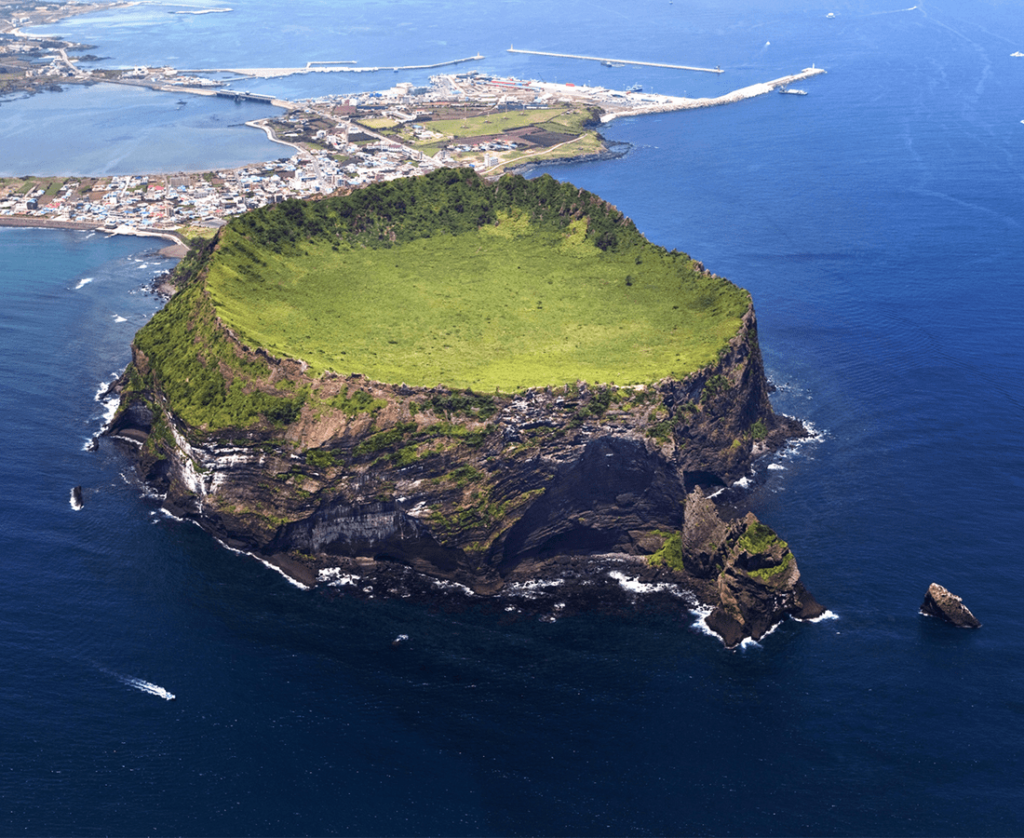
Jeju’s Unique Cuisine
Fresh Seafood
As an island surrounded by the bountiful waters of the Korean Strait, Jeju Island is a paradise for seafood lovers. From succulent sashimi to grilled fish, the island offers a wide variety of fresh seafood dishes that are sure to tantalize your taste buds. Whether you visit a local restaurant or indulge in street food, Jeju’s seafood cuisine is an absolute must-try for any food enthusiast.
Jeju Black Pork
Jeju Black Pork is a local delicacy that is famous for its tender and flavorful meat. The pigs are raised in a natural environment and fed a special diet, resulting in a unique taste and high-quality pork. There are various ways to enjoy Jeju Black Pork, from barbecued pork belly to hearty stews. Trying this local specialty is a culinary experience that will leave a lasting impression on your taste buds.
Hallabong
Hallabong is a citrus fruit that is native to Jeju Island and is known for its sweet and tangy flavor. This fruit is often referred to as “Jeju’s orange” and is highly sought after for its distinctive taste and juiciness. Hallabong can be enjoyed on its own, juiced, or incorporated into various desserts, providing a refreshing and delightful culinary experience that is unique to Jeju Island.
Pheasants in Hangover Soup
Jeju Island is also famous for its unique hangover soup, known as “Haejangguk,” which is traditionally made with pheasant meat. This hearty and flavorful soup is believed to cure hangovers and revitalize the body after a night of indulgence. Jeju’s pheasant hangover soup is a local specialty that offers a distinctive twist on this comforting dish, making it a must-try for adventurous food enthusiasts.
Sea Odongdo Ice Cream
Sea Odongdo Ice Cream is a popular dessert on Jeju Island, known for its unique combination of flavors and textures. This ice cream is made with the island’s famous Hallabong oranges and seaweed extract, creating a refreshing and slightly savory taste. The result is a creamy and delicious treat that perfectly captures the essence of Jeju Island’s natural wonders.
Hot Springs and Spas
Sanbangsan Hot Springs
Sanbangsan Hot Springs is a luxurious retreat nestled at the foot of Sanbangsan Mountain, offering a peaceful and rejuvenating experience. The hot springs are rich in minerals and are believed to have therapeutic properties that promote relaxation and healing. Visitors can soak in the warm waters while enjoying stunning views of the surrounding nature, creating the perfect ambiance for ultimate relaxation and pampering.
Hyupjae Hot Springs
Hyupjae Hot Springs is another popular hot springs destination on Jeju Island, known for its mineral-rich waters and serene atmosphere. These hot springs offer a range of amenities and treatments, including hot spring baths, sauna, and various spa services. Whether you seek relaxation or revitalization, Hyupjae Hot Springs provides a tranquil sanctuary to unwind and rejuvenate your mind, body, and soul.
Seogwipo Maeil Olle Hot Springs
Situated in the heart of Seogwipo, Seogwipo Maeil Olle Hot Springs offers a unique spa experience that combines hot springs with natural beauty. Visitors can relax in the hot spring pools while enjoying panoramic views of the ocean and surrounding landscapes. The soothing waters and picturesque surroundings make it an ideal place to unwind and escape the stresses of daily life.
In conclusion, Jeju Island is a treasure trove of natural wonders, cultural sites, and unique experiences. From its volcanic mountains and breathtaking coastlines to its botanical gardens and underwater caves, Jeju Island offers a diverse range of attractions for travelers of all interests. Whether you’re seeking outdoor adventures, cultural immersion, or relaxation in hot springs, Jeju Island has something to offer every visitor. Explore its natural beauty, indulge in its distinct cuisine, and immerse yourself in its rich heritage to create memories that will last a lifetime. Jeju Island truly is a paradise on Earth.

